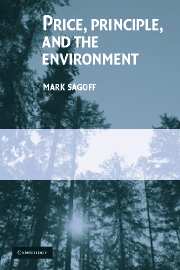Book contents
- Frontmatter
- Contents
- Acknowledgments
- 1 Zuckerman's Dilemma: An Introduction
- 2 At the Monument to General Meade or On the Difference between Beliefs and Benefits
- 3 Should Preferences Count?
- 4 Value in Use and in Exchange or What Does Willingness to Pay Measure?
- 5 The Philosophical Common Sense of Pollution
- 6 On the Value of Wild Ecosystems
- 7 Carrying Capacity and Ecological Economics
- 8 Cows Are Better Than Condos or How Economists Help Solve Environmental Problems
- 9 The View from Quincy Library or Civic Engagement in Environmental Problem Solving
- Notes
- Index
7 - Carrying Capacity and Ecological Economics
Published online by Cambridge University Press: 15 December 2009
- Frontmatter
- Contents
- Acknowledgments
- 1 Zuckerman's Dilemma: An Introduction
- 2 At the Monument to General Meade or On the Difference between Beliefs and Benefits
- 3 Should Preferences Count?
- 4 Value in Use and in Exchange or What Does Willingness to Pay Measure?
- 5 The Philosophical Common Sense of Pollution
- 6 On the Value of Wild Ecosystems
- 7 Carrying Capacity and Ecological Economics
- 8 Cows Are Better Than Condos or How Economists Help Solve Environmental Problems
- 9 The View from Quincy Library or Civic Engagement in Environmental Problem Solving
- Notes
- Index
Summary
When the tempest arose, “the mariners were afraid … and cast forth the wares that were in the ship into the sea, to lighten it of them.” This passage from the Book of Jonah anticipates a strategy many environmentalists recommend today. Nature surrounds us with life-sustaining systems, much as the sea supports a ship, which will sink if it carries too much cargo. Environmentalists therefore urge us to “keep the weight, the absolute scale, of the economy from sinking our biospheric ark.”
This concern about the carrying capacity of earth, while it may remind us of the fearful sailors on Jonah's ship, marks a departure from traditional arguments in favor of environmental protection. These arguments did not rest on prudential considerations. Early environmentalists such as Henry David Thoreau cited the intrinsic properties of nature, rather than economic benefits, as reasons to preserve it. They believed that economic activity had outstripped not its resource base, but its spiritual purpose. As we saw in the last chapter, John Muir did not call for improved cost-benefit analysis. He condemned the “temple destroyers, devotees of ravaging commercialism” who “instead of lifting their eyes to the God of the mountains, lift them to the Almighty dollar.” Nineteenth-century environmentalists, seeing that nature is full of divinity, regarded its protection less as an economic imperative than as a moral test.
By opposing a strictly utilitarian conception of value, writers such as Muir saved what little of nature they could from the “gospel of efficiency.
- Type
- Chapter
- Information
- Price, Principle, and the Environment , pp. 154 - 176Publisher: Cambridge University PressPrint publication year: 2004



